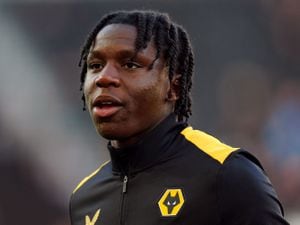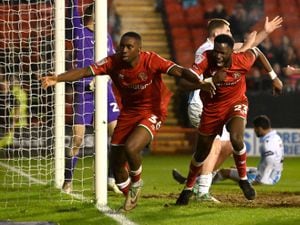Big Interview: Addicted to torture AP McCoy’s rise to greatness
What does it take to become a sports star of almost mythical status? What is the psyche driving those on to greatness?
“It has to hurt,” reveals Tony McCoy. “No matter how talented you are, the ones that have left a mark, the ones with longevity, there must be a dark side, there must be something that tortures them.
“There is a self-torture in it. You’re never happy. The ambitious always seek perfection which you can never have. You can never get to the point where you think that’s it.”
McCoy was champion jump jockey a record 20 times. He rode a record 4,358 winners.
He broke nearly every bone in his body in a remarkable career spanning two decades the likes of has never been seen before and will never been seen again.
But three years on from retirement, and he’s still not content. He never really has been.
“It’s very difficult to find a purpose,” he admits. “I’m a realist. The life I led is not coming back.
“No matter what happens for the rest of my life, nothing will ever be able to replace winning the Cheltenham Gold Cup in front of 75,000 people cheering you.
“No matter whether you become the next (technology entrepreneur like) Elon Musk or Jeff Bezos, it isn’t the same because you’re never going to have the adulation. Or the abuse of not performing.
“You’re never going to have the ups and downs of performing on a stage.
“If you want to be a successful sports person you have to go to that big stage and it’s a near-on arrogant thing to say, but you have to think ‘they’re all here to see me’.”
Words are tumbling out of McCoy as fast as he used to ride.
The Northern Irishman has no problems bearing his soul in the corner of a bar at The Belfry Golf Club ahead of an event for the Midlands Air Ambulance, a charity he supports because of their valuable service for jockeys.
“I’m not saying I’m not going to do nothing for the rest of my life, but I know I won’t be able to get up in the morning and live every day of my life for 20 years in fear,” he continues.
“That’s the thing. I used to get up every morning and be frightened I wasn’t going to be very good. Every day.
“Even if I was good, I was frightened it was going to be my last day of being good. The period of winning and being successful lasts for a very short period of time.
“It’s like an addiction, a drug, you can’t ever get enough of the fix, because the only time that little adrenaline rush lasts is from the minute you pass the winning post and go into the weighing room.
“Because the race is over and in half an hour there’s another race and somebody else is going to win.
“It’s a very addictive thing, to be successful at it you have to be addicted to it, you have to be near-on obsessed. You can’t ever be content, I was never content in 20 years.
“I obviously loved what I did. But I never for one moment thought that I’d made it.
“After about 10 or 12 years of being champion jockey everyone said how miserable I was, but it wasn’t misery, I was so unaccepting of myself.”
McCoy’s obsessive character is put to the test halfway through the interview when a punter comes over and informs him he once rode a horse he owned with a syndicate.
Now this ultimate jockey of jockeys rode enough races to go around the world twice. He rode 18,000 horses in his career.
But when the man mentions the horse’s name, McCoy can name the track – “Uttoxeter” – and the markings too. “I always remember the markings,” he turns and says.
The man reminds McCoy – foolishly – that he won on the horse and told them to sell it immediately because it would never win another race.
But McCoy remembers. “And it never did, did it?” he responds.
The man thinks for a moment. “No, I don’t think it did!” he laughs.
His encyclopaedic knowledge of his own career is impressive, but then McCoy reveals exactly how addicted to racing, and how addicted to winning, he was.
In his final season, he was breaking all sorts of records, knowing he was going to retire at the end of the year.
“Then I got injured one Thursday night in Worcester,” he says. “Punctured my lung and dislocated my collar bone and broke three ribs.
“It was the last race, I wouldn’t let them take me in the ambulance. I was so stubborn and I knew I was in trouble.
“I went back to the weighing room with the doctor and he was checking my oxygen levels, he said ‘you need to go to hospital’.
“I said ‘well if I’m going to hospital, you’re taking me, nobody is knowing I’m hurt’. He was my GP and I put him in a lot of very awkward positions during my career.”
By next Tuesday, McCoy was racing again.
He shook off the broken bones as if they were nothing and demanded X-rays on his lung constantly.
The very moment he was just about OK, he was back on the horse. But it didn’t last long.
“I rode on the Tuesday and rode three winners,” he says. “I rode the next day on the Wednesday, had a bad fall in Exeter and the whole thing blew up.
“It was the only time in my life I felt it mentally troubled me.
“I knew I was retiring, I knew I could quite possibly have ridden 300 winners in a season. It was the one time I felt mentally disturbed.”
Horse racing is a dangerous sport, and jockeys get injured all the time. But McCoy was furious.
“I thought I was going to do something that had never been done and then I was going to just quit,” he said. “I don’t think I’m mentally over it still.
“I can’t believe I got injured. By the way I rode 18,000 races. That’s the equivalent of travelling two-and-a-half times around the world on a horse. I am going to get injured, I always knew I would.
“But I couldn’t get my head around letting myself get injured on this particular occasion.
“I thought I was above it, I thought I was more aware, I thought I was much sharper, my reactions were quick enough that even if I was in a bad position I could get out of it. I can’t get it out of my head.”
McCoy appears to be battling with demons even now, right here, in the atrium of The Belfry. Has he ever sought help, I tentatively ask.
“Oh yeah I’ve seen psychologists,” he says, not concerned by any intrusion. “I went to see one in 1996, I got friendly with a few lads from Liverpool.
“They were at the races one day, I was meant to go out with them that night for dinner, I was having a bad day and I went up to their box, and I said ‘I’m going home’.
“It was Steve McManaman and Robbie Fowler, I was really friendly with them, and this other person was giving it out, saying ‘don’t be so miserable.’
“He said ‘I’ve got this psychologist, you should go see him’. I thought, you know what, this might make me better.
“I’d been champion jockey once or twice and I was always prepared to try anything. I went to see him and thought it was quite interesting, he talks about controlling the controllable.
“I went back three weeks later, two hours chatting away. Then I went three weeks later and I thought ‘You need a psychologist, not me’. That was the end of that.”
McCoy knows he’s wired differently. He’s aware he needs a stronger tonic.
“I need a hypnotist,” he exclaims. “I need someone to tell me when you go home after a s**t day, it’s OK.
“Which is never going to happen, because I didn’t want to feel it was all right. When I had a bad day I wanted to feel like I’d had a bad day so I didn’t have a bad day tomorrow.”
And so now, his life is missing something. It’s missing that buzz he used to crave, that buzz he was the best in the world at delivering.
“This is a very difficult thing to say but I’m 44 and if you said to me there’s one thing in the world you could have, or go, or be, there’s nothing.
“Is that a nice position to be in or not? I don’t know.
“I still watch the racing, I’m working with ITV. Is it anything like racing? No. Does it give me any buzz being on TV? None whatsoever.
“That’s a bit harsh, I like talking about it because I want to be there anyway. But would it bother me if I was never on TV again? Not really.”
What about any hobbies?
“I can play golf but I’m not mentally strong enough for that,” he says. “It wrecks my head. I can’t cope with how mediocre I am at it. I can’t cope with how moderately poor I am.”
McCoy appears unique. But has he ever met any sports stars with the same mentality as him?
“You could see it in some of them,” he says. “It’s a hard one, look at all these brilliant sportspeople, whether it’s Mike Tyson, Tiger Woods, Zinedine Zidane, they’ve all got dark sides.
“I said that to my wife one day and she just looked me up and down and said ‘Well, you know’. I didn’t talk about it anymore after that!
“I do think there has to be an element of craziness inside of you.
“There has to be a willingness to go really deep into something. To continuously want to get to the point where it has to hurt.”
Talking to Tony McCoy is an insight into the psyche of greatness, what it takes to become more than just the best in your class, or the best in your era, but the best of all time.
It’s an insight into the pain, the obsession, the drive and the addiction every sports star that transcends into myth needs.
And here’s the punchline. Those true greats are only measured by how discontent they are.
“Now you can go away very disturbed,” he finishes.
“But I couldn’t get my head around letting myself get injured on this particular occasion.
“I thought I was above it, I thought I was more aware, I thought I was much sharper, my reactions were quick enough that even if I was in a bad position I could get out of it. I can’t get it out of my
head.”
McCoy appears to be battling with demons even now, right here, in the atrium of The Belfry. Has he ever sought help, I tentatively ask.
“Oh yeah I’ve seen psychologists,” he says, not concerned by any intrusion. “I went to see one in 1996, I got friendly with a few lads from Liverpool.
“They were at the races one day, I was meant to go out with them that night for dinner, I was having a bad day and I went up to their box, and I said ‘I’m going home’.
“It was Steve McManaman and Robbie Fowler, I was really friendly with them, and this other person was giving it out, saying ‘don’t be so miserable.’
“He said ‘I’ve got this psychologist, you should go see him’. I thought, you know what, this might make me better.
“I’d been champion jockey once or twice and I was always prepared to try anything. I went to see him and thought it was quite interesting, he talks about controlling the controllable.
“I went back three weeks later, two hours chatting away. Then I went three weeks later and I thought ‘You need a psychologist, not me’. That was the end of that.”
McCoy knows he’s wired differently. He’s aware he needs a stronger tonic.
“I need a hypnotist,” he exclaims. “I need someone to tell me when you go home after a s**t day, it’s OK.
“Which is never going to happen, because I didn’t want to feel it was all right. When I had a bad day I wanted to feel like I’d had a bad day so I didn’t have a bad day tomorrow.”
And so now, his life is missing something. It’s missing that buzz he used to crave, that buzz he was the best in the world at delivering.
“This is a very difficult thing to say but I’m 44 and if you said to me there’s one thing in the world you could have, or go, or be, there’s nothing.
“Is that a nice position to be in or not? I don’t know.
“I still watch the racing, I’m working with ITV. Is it anything like racing? No. Does it give me any buzz being on TV? None whatsoever.
“That’s a bit harsh, I like talking about it because I want to be there anyway. But would it bother me if I was never on TV again? Not really.”
What about any hobbies?
“I can play golf but I’m not mentally strong enough for that,” he says. “It wrecks my head. I can’t cope with how mediocre I am at it. I can’t cope with how moderately poor I am.”
McCoy appears unique. But has he ever met any sports stars with the same mentality as him?
“You could see it in some of them,” he says. “It’s a hard one, look at all these brilliant sportspeople, whether it’s Mike Tyson, Tiger Woods, Zinedine Zidane, they’ve all got dark sides.
“I said that to my wife one day and she just looked me up and down and said ‘Well, you know’. I didn’t talk about it anymore after that!
“I do think there has to be an element of craziness inside of you.
“There has to be a willingness to go really deep into something. To continuously want to get to the point where it has to hurt.”
Talking to Tony McCoy is an insight into the psyche of greatness, what it takes to become more than just the best in your class, or the best in your era, but the best of all time.
It’s an insight into the pain, the obsession, the drive and the addiction every sports star that transcends into myth needs.
And here’s the punchline. Those true greats are only measured by how discontent they are.
“Now you can go away very disturbed,” he finishes.





